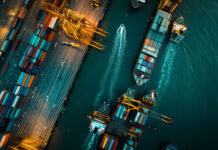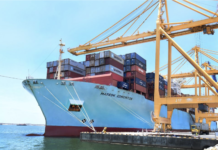
Aiming to become a hub for technology and innovation, the Ras al-Khair Special Economic Zone is expected to make significant contributions to the Saudi Arabian economy.
Key activities in the zone include shipbuilding, offshore rig fabrication, and related services such as maintenance, repair, and operations (MRO).
This zone, along with others, supports the Kingdom’s Vision 2030 by promoting economic growth and diversification through import substitution, exports, and innovation.
A crucial element of this strategy is positioning Saudi Arabia as a global maritime hub, capitalizing on its strategic location between three continents and the fact that 6% of global maritime trade passes through Saudi ports. These ventures into new sectors have driven the substantial growth and transformation of the Kingdom’s economy in recent years.
“The most dramatic shift has been Saudi Arabia’s emergence as an investment destination, with FDI quadrupling since 2016 and the kingdom experiencing the second fastest post-COVID investment rebound in the world,” stated Khalid al-Falih, Saudi Arabia’s minister of Investment and chairman of the Economic Cities and Special Zones Authority.
The Ras al-Khair Special Economic Zone (SEZ) and surrounding areas are supported by a robust network of infrastructure and cutting-edge technologies. Industry 4.0 technologies, such as artificial intelligence (AI) and the Internet of Things (IoT), are integrated at various levels to enhance efficiency. These technologies optimize schedules and reduce delays, with IoT tracking cargo containers and AI processing the data for real-time insights, thus minimizing inefficiency and fostering data-driven decision-making.
In addition, incorporating these technologies from the outset helps future-proof Ras al-Khair SEZ and maintain its global competitiveness. Major investments from Saudi Aramco, Bahri, Lamprell, Hyundai Heavy Industries (HHI), Baosteel, and the Saudi government finance these advancements. Several incentives have been introduced to attract further investment, including:
– Permanent 0% withholding tax for profit repatriation from the SEZ to foreign countries.
– Flexible and supportive regulations for foreign talent during the first five years.
– 0% VAT for all intra-SEZ goods exchanged within and between zones.
– 5% corporate income tax for up to 20 years.
– 0% customs duties deferral for goods within the SEZ.
– Exemption from expat levy fees for employees and their families in the SEZ.
International Maritime Industries (IMI) has already signed offtake agreements totalling US$10 billion over 10 years with partners Aramco and Bahri, for the delivery of 20 rigs and 52 vessels, fulfilling at least 75% of Bahri’s commercial vessel needs from the shipyard over this period.
These factors, combined with the current economic climate, create significant growth potential for Ras al-Khair and the Kingdom as a whole. The Saudi shipbuilding and MRO market is projected to grow by approximately 23% between 2021 and 2030, while the offshore rigs market is expected to grow by 20% during the same period. Between 2021 and 2030, Ras al-Khair SEZ is projected to contribute US$32 billion to exports, US$1.4 billion in FDI, US$22 billion to GDP, and create over 80,000 jobs.
The country’s maritime and mining sectors are crucial to achieving these goals, with Ras al-Khair SEZ at their core. Saudi Arabia has the lowest aluminium production costs globally, thanks to significant bauxite deposits and untapped mining reserves estimated at US$2.5 trillion.
With increasing demand for offshore platforms in the Arabian Gulf and the broader Middle East, Ras al-Khair SEZ is well-positioned to become a major supplier through its shipbuilding, rig fabrication, and MRO activities. Supported by substantial investment and modern infrastructure, the SEZ offers an attractive environment for business growth and investment.








